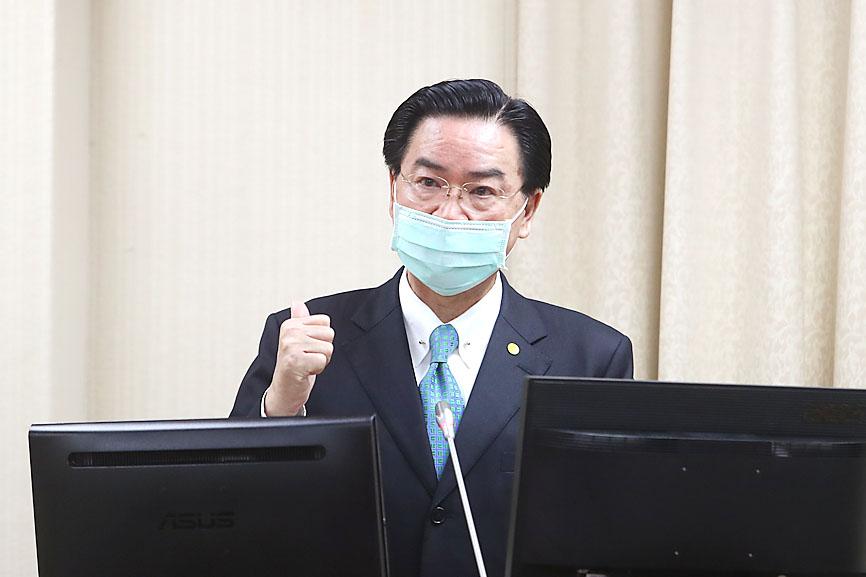The government looks forward to negotiating with Beijing on certain issues, but it cannot ignore the threats presented by China, Minister of Foreign Affairs Joseph Wu (吳釗燮) told lawmakers yesterday.
Wu was speaking at a meeting of the Legislative Yuan’s Foreign Affairs and National Defense Committee.
Chinese Nationalist Party (KMT) Chairman Johnny Chiang (江啟臣) asked him to explain Taiwan’s position amid the evolving competition between the US and China.

Photo: CNA
Chiang described President Tsai Ing-wen’s (蔡英文) diplomatic policy as “aligning with the US and countering China,” but Wu said that it is more than that.
The government hopes to have an opportunity to negotiate with China, Wu said, without specifying what issues would be discussed.
Asked if Taiwan should side with China or the US, or act as a bridge between the two, Wu said that the government has some flexibility, but it would not change its position of prioritizing national interests.
Since US President Joe Biden took office in January, Tsai’s administration has more often conveyed the intent to communicate with Beijing, although she said in February that the Chinese government “holds the key.”
Chiang asked if Taiwan and the US would resume the Trade and Investment Framework Agreement meeting that has been suspended since October 2016.
While many US lawmakers continue to voice support for starting talks on a bilateral trade agreement, the problem is whether trade talks with Taiwan are a priority for the US administration, especially after Taiwan lifted restrictions on US pork products containing traces of ractopamine, Chiang said.
The government is working to resume the meeting, quite likely this year, Wu said.
Democratic Progressive Party (DPP) Legislator Wang Ting-yu (王定宇) asked Wu whether Biden’s administration during its first year would send high-ranking officials to visit Taiwan, as encouraged in the US’ Taiwan Travel Act.
The ministry does not rule out the possibility, but there are presently no such plans, Wu said, adding that good precedents were set last year when US officials visited.
Wang also asked if the ministry has received more requests from European lawmakers to visit, after Chinese Ambassador to France Lu Shaye’s (盧沙野) threat to French Senator Alain Richard backfired.
Wu said that high-ranking lawmakers from many countries have expressed their intention to visit Taiwan, but added that the government would need to plan carefully due to COVID-19 prevention concerns.

In his National Day Rally speech on Sunday, Singaporean Prime Minister Lawrence Wong (黃循財) quoted the Taiwanese song One Small Umbrella (一支小雨傘) to describe his nation’s situation. Wong’s use of such a song shows Singapore’s familiarity with Taiwan’s culture and is a perfect reflection of exchanges between the two nations, Representative to Singapore Tung Chen-yuan (童振源) said yesterday in a post on Facebook. Wong quoted the song, saying: “As the rain gets heavier, I will take care of you, and you,” in Mandarin, using it as a metaphor for Singaporeans coming together to face challenges. Other Singaporean politicians have also used Taiwanese songs

NORTHERN STRIKE: Taiwanese military personnel have been training ‘in strategic and tactical battle operations’ in Michigan, a former US diplomat said More than 500 Taiwanese troops participated in this year’s Northern Strike military exercise held at Lake Michigan by the US, a Pentagon-run news outlet reported yesterday. The Michigan National Guard-sponsored drill involved 7,500 military personnel from 36 nations and territories around the world, the Stars and Stripes said. This year’s edition of Northern Strike, which concluded on Sunday, simulated a war in the Indo-Pacific region in a departure from its traditional European focus, it said. The change indicated a greater shift in the US armed forces’ attention to a potential conflict in Asia, it added. Citing a briefing by a Michigan National Guard senior

CHIPMAKING INVESTMENT: J.W. Kuo told legislators that Department of Investment Review approval would be needed were Washington to seek a TSMC board seat Minister of Economic Affairs J.W. Kuo (郭智輝) yesterday said he received information about a possible US government investment in Taiwan Semiconductor Manufacturing Co (TSMC, 台積電) and an assessment of the possible effect on the firm requires further discussion. If the US were to invest in TSMC, the plan would need to be reviewed by the Department of Investment Review, Kuo told reporters ahead of a hearing of the legislature’s Economics Committee. Kuo’s remarks came after US Secretary of Commerce Howard Lutnick on Tuesday said that the US government is looking into the federal government taking equity stakes in computer chip manufacturers that

CLAMPING DOWN: At the preliminary stage on Jan. 1 next year, only core personnel of the military, the civil service and public schools would be subject to inspections Regular checks are to be conducted from next year to clamp down on military personnel, civil servants and public-school teachers with Chinese citizenship or Chinese household registration, the Mainland Affairs Council (MAC) said yesterday. Article 9-1 of the Act Governing Relations Between the People of the Taiwan Area and the Mainland Area (臺灣地區與大陸地區人民關係條例) stipulates that Taiwanese who obtain Chinese household registration or a Chinese passport would be deprived of their Taiwanese citizenship and lose their right to work in the military, public service or public schools, it said. To identify and prevent the illegal employment of holders of Chinese ID cards or